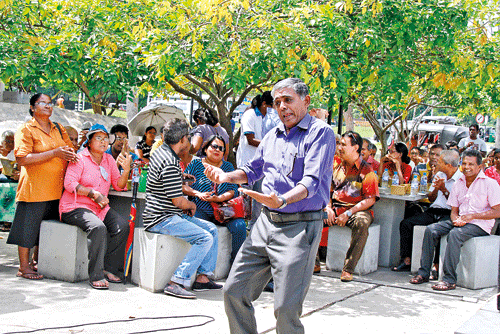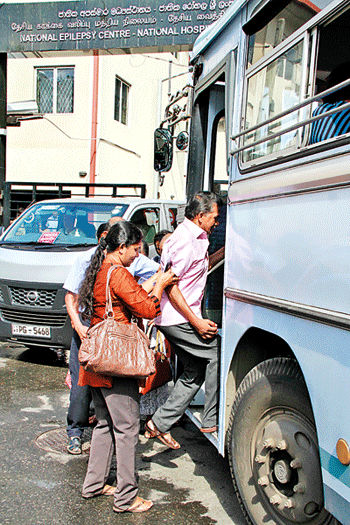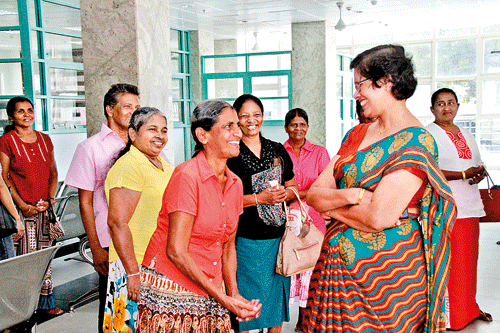A time for laughter and even a little dance

Shantha on the ‘dance floor’ at Diyatha Uyana. Pix by Indika Handuwala
Battaramulla’s Diyatha Uyana – a hive of activity on a Saturday morning. Men, women and children, strolling leisurely around, stopping-by stalls selling ornamental plants and fish, fruits and vegetables and much more.
For newly-weds it is an ideal photo-scene, what with the Diyawanna Oya flowing quietly by.
On Saturday, August 26, though, all these people including a red-saree draped bride and her party, most probably on their way to the home-coming, pause awhile from taking photographs, to stop and look on with curiosity and then also learn a little bit about stroke.
The messages from the posters and the brief speeches are clear – stroke is treatable and it is vital to take a stroke-victim to hospital immediately.
While for passers-by it was just another Saturday, for a large knot of people, about 100, seated on the concrete stools under the shade of the few trees dotting the centre of Diyatha Uyana it was a very special day.
It was the looked-forward-to first “day out” for those not only struck down by stroke and on the road to recovery but also their carers.
Having helped them through an immensely difficult time soon after being hit by stroke, the outing was part of programmes being conducted by the Stroke Support Organization for Sri Lankans . It was arranged by the Stroke -Support Group of the National Hospital (NHSL) in Colombo.
With unstinting support from NHSL’s Director, Dr. Anil Jasinghe, and the blessings of the Health Ministry, the core-group which has gone beyond the call of duty of treating and managing stroke, to make life worth living for those disabled by this disease is led by the NHSL’s Head of the Neurology Institute and Senior Consultant Neurologist Dr. Padma Gunaratne.

A helping hand to board the bus
The others are Consultant Neurologist Dr. Gamini Pathirana; Dr. Arosha Siriwardhana; Nursing Officers from the stroke wards; Physiotherapist Sampath Abeywardhana and his team of eight; Speech and Language Therapists Prabhani Dineshika, Asanka Weerasinghe and Asanka Wijerathne; Occupational Therapists Lasanthi Siriwardhana and Chinthaka Kannangara; Psychological Counsellor Renu Shiromala; Social Services National Coordinator for Community-based Rehabilitation, Dhammika Wasala and Social Services Officer Lakshadi; and health-care assistants in the wards and the clinics.
The Stroke Support Group has been initiated as Dr. Gunaratne had felt a dire need to give a helping hand to patients once they leave hospital and had been laying the ground work for it for awhile.The hope is that such groups will be replicated in other major state hospitals.
A first in Sri Lanka, although other countries have such networks for stroke support, the time was right as the prevalence of stroke is high now and alarmingly the younger population is prone to stroke.
The Stroke Support Group is a platform for stroke survivors to communicate among themselves, to facilitate further rehabilitation, to build awareness and also help the carers and family of stroke survivors to have a small break.
Suddenly, Diyatha Uyana echoes with music from a guitar and serpina, which fills the air with the haunting notes of Dhanno Budunge.
We have followed their dragging footsteps and unsure demeanour and seen how they help each other from the time they gathered at the Epilepsy Building of the NHSL that morning. Greeting the staff and each other linked closely by a difficult illness, they have battled stroke and overcome odds to smile through their tears. They are undergoing therapy as outpatients, having moved from the tender care of the NHSL’s multi-disciplinary Stroke Unit to be back on their feet again at home.
Having boarded a bus, expectation is in the air as they head for Diyatha Uyana, while others join them there itself under the shepherding of the core-group.
They are more than willing to share their stories. H.G.D Manjula Dilrukshi, 46, from Werahera in Boralesgamuwa just felt as if “pana ne” (lifeless) and her nerves were being pulled. Hithuwe hiri wathayak kiyala, she says of the numbness overcoming her. Brought to hospital, her brain was scanned and a stroke diagnosed without delay.
“Luckily for me, I came under the care of Dr. Padma,” says emotional Dilrukshi who is all smiles even though she has “podi, podi prashna” after recovery, like a few fingers not working too well, a leg feeling leaden and a feeling of tilting to a side when walking.

Greetings and smiles when Dr. Padma Gunaratne meets her patients at the NHSL
Fifty-two-year-old Shantha Hettiarachchi was a three-wheeler driver, when three months ago at his ‘stand’ at the Fort Railway Station he felt his mouth going to a side. A diabetic, with hypertension (high blood pressure), he realized something was wrong when he felt a strong weakness on his right side. Immediately, he came to the NHSL.
And as the music takes off, Shantha is the first to take to the ‘dance’ floor, skilled as ever and coaxing others to do the same.
There is laughter, singing, clapping, toe-tapping, selfie-taking and snacking with everyone being provided nicely-packed boxes of eats from a well-known café, while bottles of water and piping hot tea are distributed through the generous sponsorship of Nimal and Kusum Kanthi Jayawardane who have experienced stroke in their family.
“We can be part of society. We can integrate. We can be part of social activity. We can care and share and we can help each other,” says Dr. Gunaratne, reiterating that all those who are gathered at Diyatha Uyana are the bearers of this message.
As Dr. Gunaratne pays tribute to her dedicated team who are a “yoda shakthiyak”, the consensus among the stroke patients is: “Suvishesha kata youththak.” (It is a special activity.)
“Ge athulata wela innavata vediya, meka manasata hondai,” says Shantha, voicing what everyone else is thinking – without being closeted at home, this is good for the mind.
We leave the happy gathering with the motivational words of Rajika Nirmali ingrained in our minds – Mata puluwannam, hemotama puluwan, says this university lecturer who was struck down by stroke but has struggled back onto her feet and is a teacher now.


